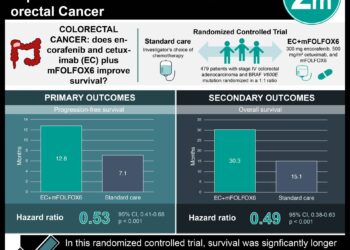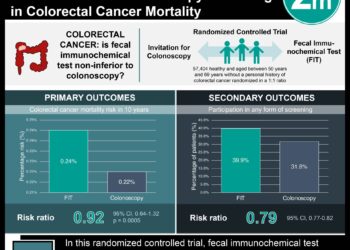High incidence of cognitive impairment associated with colorectal cancer
1. In a prospective study of over 360 patients with colorectal cancer (CRC), there was a significant increase in the incidence of cognitive impairment compared to healthy controls.
2. The incidence of cognitive impairment in the CRC population was independent of chemotherapy effects.
Evidence Rating Level: 2 (Good)
Study Rundown: Although impaired cognitive function is a well-reported sequela of within the breast cancer population, less is known about this phenomenon in patients with CRC. Previous studies in the CRC population have demonstrated variable incidence of cognitive impairment and were limited methodologically by small sample sizes and lack of comparison groups. The purpose of this large, prospective cohort study was to further evaluate the incidence of cognitive impairment within the CRC patient population.
The trial prospectively followed over 360 patients with CRC with formal cognitive assessments and questionnaires for 24 months. At the conclusion of the study, patients with CRC demonstrated a significantly higher risk of cognitive decline compared to healthy controls. This effect was independent of chemotherapy status. Complex processing speed, verbal memory, and attention were the cognitive domains most affected in this cohort. The results of this trial support the hypothesis that patients with CRC have a significant risk of cognitive decline, starting at the time of diagnosis. This highlights the importance of screening and treatment of cognitive symptoms such as fatigue, anxiety, and depression in this patient population. The study is limited by the use of a questionnaire longitudinally, which may result in practice bias. However, the large sample size and the use of control groups strengthens the concerns about cognitive decline among cancer patients raised by this study.
Click to read the study in JCO
Relevant Reading: Cognitive function and fatigue after diagnosis of colorectal cancer
In-Depth [prospective cohort]: This was a large, multicenter, prospective cohort study that evaluated the incidence of cognitive impairment in patients with CRC. Patients with stage III or high-risk stage II colorectal cancer (CRC) treated with surgery with or without chemotherapy were included in the study. Patients were excluded if they had a history of prior malignancy or other comorbidities that could affect cognitive performance. Cognitive testing and patient-reported outcome questionnaires were completed at every six months and followed up to 2 years. The primary end points were cognitive function, as determined by the Global Deficit Score (GDS), a scoring system which compiles the results of several validated neuropsychological tests. Overall, 362 patients with CRC and 73 healthy controls were included in the study. At the conclusion of the study, there was a significant increase in the incidence of cognitive deficit in the CRC group versus the healthy controls (43% vs. 15%; p < 0.001). In sub-group analysis, there was no signify difference in cognitive decline between CRC patients who received or did not receive chemotherapy.
Image: PD
©2015 2 Minute Medicine, Inc. All rights reserved. No works may be reproduced without expressed written consent from 2 Minute Medicine, Inc. Inquire about licensing here. No article should be construed as medical advice and is not intended as such by the authors or by 2 Minute Medicine, Inc.







